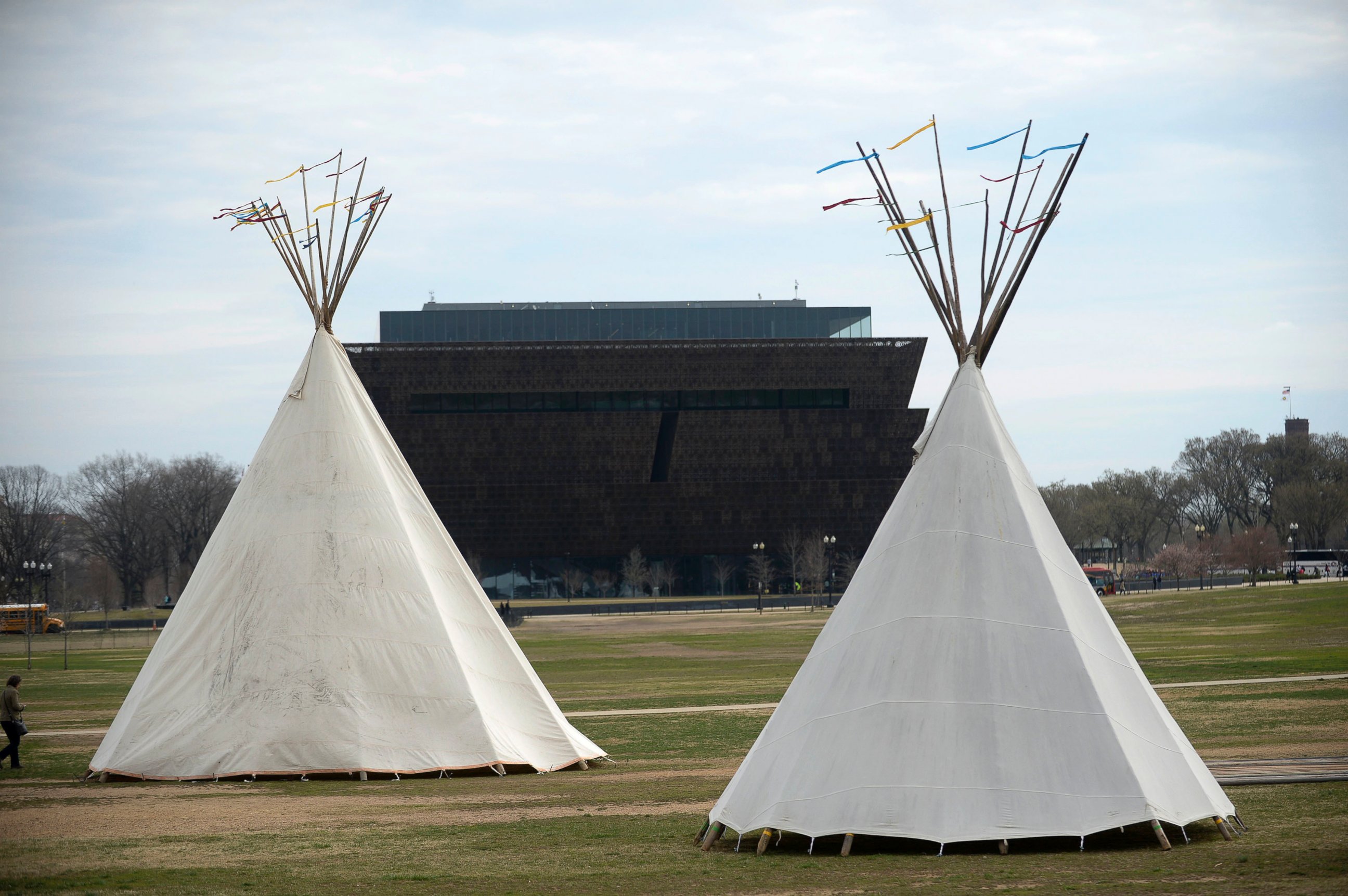Standing Rock fight comes to Washington for multiday protest
Indigenous activists erected a tipi camp beside the Washington Monument today.
— -- Indigenous rights activists erected a tipi camp beside the Washington Monument in the nation’s capital Tuesday as part of a day protest against the Dakota Access pipeline, as well as over other indigenous issues.
“This fight isn't over,” Mike Gamms, who came in from Los Angeles, told ABC News. “A lot of people thought the fight was over back in December or they think the fight is over now and it's a lost battle but there's still a lot of fight left and a lot more that can be done.”
Organized by the Native Nations Rise Planning Committee, the camp will host cultural workshops, speaker panels and water blessings over the next few days, according to its website, which notes that no overnight camping will be allowed.
On Friday, the events will culminate in a march from the Army Corps of Engineers headquarters to Lafayette Square, just outside of the White House. Organizers expect thousands to take part.
On Dec. 4, during the waning days of the Obama administration, then-assistant secretary of the Army for Civil Works, Jo-Ellen Darcy, announced that an easement would not be granted for the Dakota Access pipeline to cross under the Missouri River. Darcy said at the time of the decision that the Army Corps would engage in additional review and analysis, including a “robust consideration and discussion of alternative locations for the pipeline crossing the Missouri River,” a process that could have taken years. The Army followed Darcy’s announcement by publishing its intent to prepare a full environmental impact statement in the Federal Registry.
The victory was short-lived, however.
Less than a week after taking office in January, President Donald Trump signed a memorandum ordering the Army Corps of Engineers to “review and approve” the pipeline in an expedited manner “to the extent permitted by law.” Two weeks after Trump’s memorandum, the Corps issued the easement needed for the project to cross under the Missouri River. In late February, law enforcement cleared most of the North Dakota "prayer" camps where thousands of self-described "water protectors" had captivated the nation for nearly a year and construction on the Missouri River crossing resumed.
This week's event in D.C., while born out of the Standing Rock Sioux Tribe’s efforts to halt the controversial Dakota Access pipeline, aims to serve as a wider call for indigenous rights. Organizers say the Standing Rock movement has “evolved into a powerful global phenomenon highlighting the necessity to respect Indigenous Nations,” according to the march’s website.
"Our plan here is to really be a central hub for a lot of information of ongoing issues going on across quote-on-quote Indian country," Dallas Goldtooth, an organizer with the Indigenous Environmental Network, told ABC News.

"This is also a space for a lot of tribal representatives, frontline grassroots leaders to do some workshops, presentations about issues that are affecting their land, their homelands, their peoples and just to be a hub to really organize and celebrate," Goldtooth said.
While the nearly yearlong presence of "prayer" camps in North Dakota ultimately failed to stop the Dakota Access pipeline from crossing under the Missouri River, the Standing Rock movement established a template for resistance now followed by tribal peoples across the country. Indigenous activists in Iowa, Texas, Florida, New Jersey and Oklahoma are all protesting other pipelines using lessons learned from Standing Rock.
Organizers of this week’s D.C. protest want the government to require tribal consent when considering major infrastructure projects crossing through or near tribal lands, as opposed to the consultation process now required by federal law. They also want President Trump to meet with tribal leaders to discuss indigenous rights, according to a list of demands on their website.
Today, as protesters converge on Washington, a federal judge ruled against a preliminary request from the Cheyenne River Sioux Tribe to block the final phase of the Dakota Access pipeline on religious grounds. Both the Standing Rock and Cheyenne River Sioux Tribes have challenged the project in a lawsuit, with a ruling expected in April.
“While this preliminary ruling is disappointing, it’s not surprising," Dave Archambault, chairman of the Standing Rock Sioux Tribe, said in a statement.
"It is very difficult to get an injunction in a case like this. The bigger legal battle is ahead -- we stand strong," he added.




